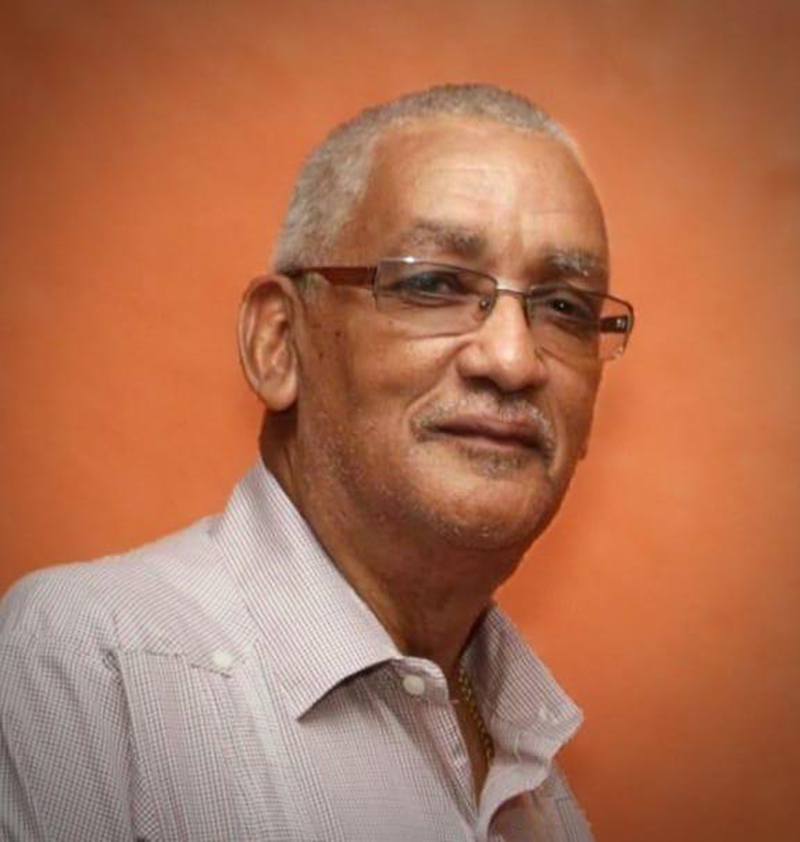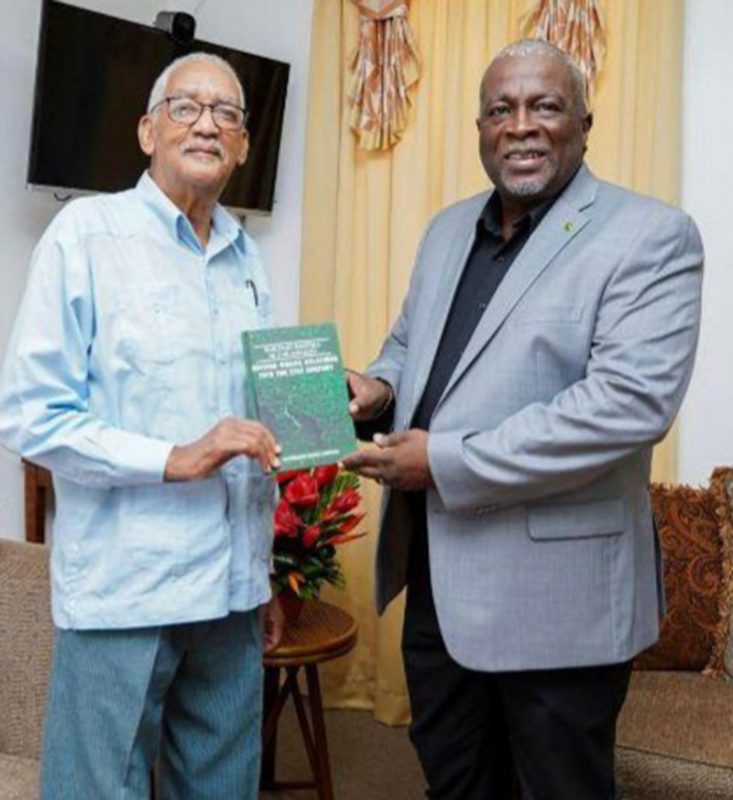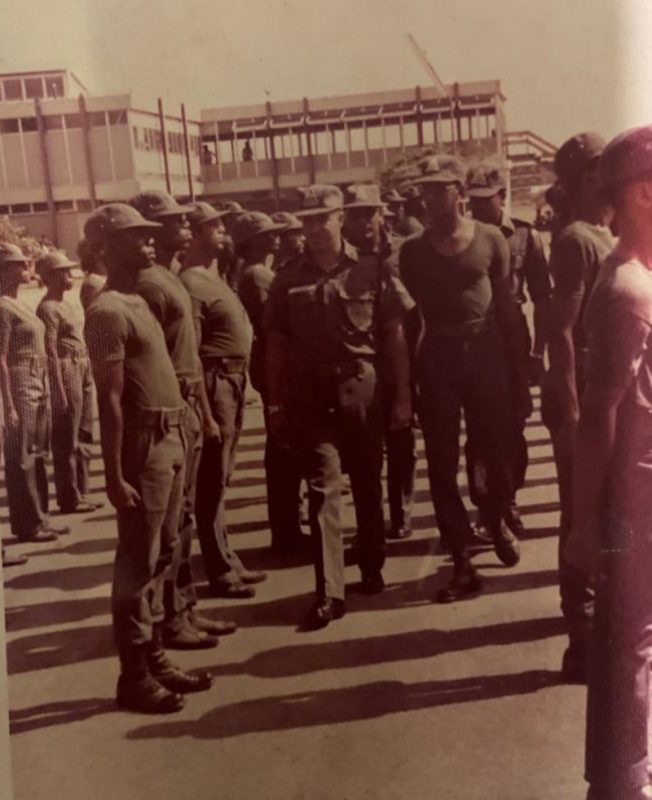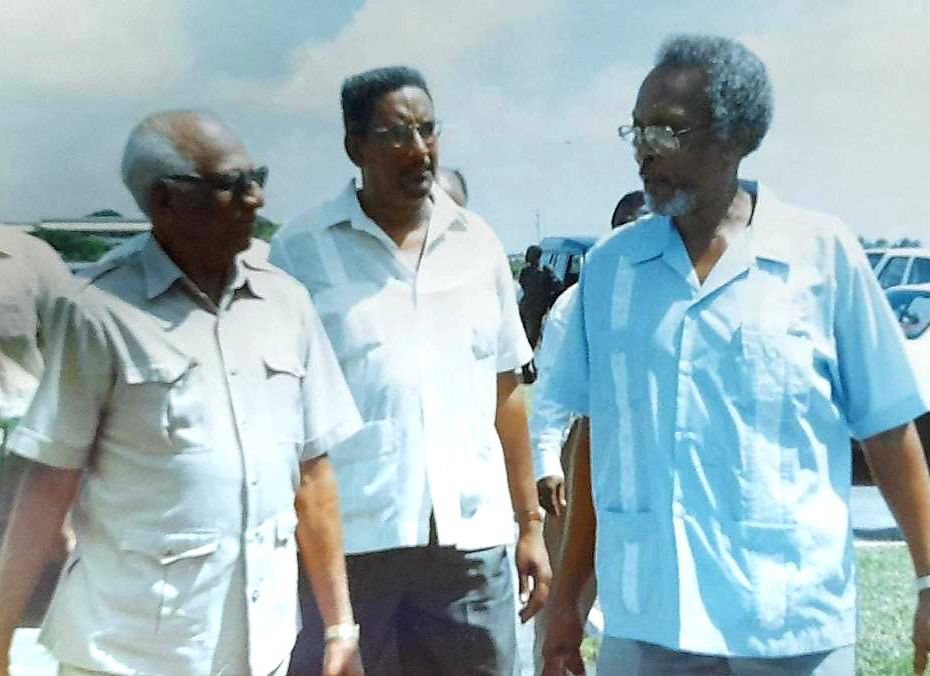Having spent more than half of his life wrapped up in academia at the University of Guyana (UG) and the University of the West Indies (UWI), Dr Mark Kirton is currently working quietly in the background at home but with his heart still on tertiary education.
Now 71, he spent 30 years of his working life providing unbroken service, with periods of study at UG and a further 13 years at the UWI St Augustine Campus, Trinidad and Tobago where he contributed to Guyana and the Caribbean region’s development through tertiary education, and supporting the regional integration effort. Through studies, research and teaching, he gained experiences which he believes added to his understanding of life, politics, government and how to manage people and ideas, he told Stabroek Weekend.
“Universities have allowed us to impart knowledge, to see our students grow. Students must always strive for excellence in whatever they do and must look for positive outcomes,” Kirton said. “Being a late developer is no setback. It is not where you start, it is where you end. As Guyanese, we need to look beyond the narrowness of race and political preference to one that is national. I will continue to call for inclusivity in our society and to bring equity to the wider mass of our society to ensure all benefit from the new sectors that are emerging including the oil and gas sector.”
The educator and author has suggested that the Guyana School of Agriculture and the National Agricultural and Research Extension Institute be brought under UG as the UG School of Agricultural Development.
“Pool the resources from those institutions, widen it to include veterinary medicine, research and strengthen specialised areas,” he plugged. “At the same time, I had recommended and continue to ask that consideration be given to merging the Cyril Potter College of Education into the Faculty of Education at UG and establish a School of Education. Have a synergistic relationship so there is no duplication of efforts.”
Schools of agricultural development and education at UG, he said, will not only serve Guyana but the wider region.
“We have some niche areas: forestry, agriculture, fisheries, that UG could formally develop. We can become one of the regional powerhouses in relation to the delivery of academic and professional programmes in those areas,” he stressed.
Noting that Guyana shares borders with non-English speakers, he suggested that UG look at programmes in second languages acquisition. “We could attract non-English speakers to Guyana because of our proximity to Brazil, Venezuela, Colombia, Suriname and French Guiana. We could become a hub for second languages’ training. There are some areas not only UG can do but there is also a role for private sector educational institutions.”
Going forward, he said, “I will continue to write and research. I would like to mentor youths and to provide any advice and recommendation in my area of competence that benefits public policy.”
Background
Born in Georgetown, Kirton grew up in Kitty which was then the first village on the East Coast Demerara. “It was a mixed community,” he recalled.
One of four brothers, his father, the late Clarence Kirton was the first black editor of a newspaper, the Daily Argosy, in British Guiana. His mother was a strong influence on the family and both his parents were firm believers in a sound and rounded education.
“We grew up among Hindus, Muslims and Christians and I think I could still sing a bhajan,” he mused. “That was an era when the values the village inculcated in us, ensured children had respect for adults. Kitty had its own police station, train station, market, post office and several schools, private and denominational.”
Kirton first attended St James the Less Anglican School and the privately-owned Walker’s Under 12. In 1962, he was one of two pupils, the other being Patrick Belgrave, who obtained a Kitty Village Council Scholarship. The two tied for the highest marks at the then common entrance examinations and were awarded full scholarships at Queen’s College (QC).
“I was no front runner at QC, but I had a very rounded education. I represented the school in cricket, football and table tennis. I was a member of Queen’s College Cadet Corp and I rose to the rank of sergeant,” he recalled.
After leaving school in 1970, Kirton joined the Guyana Defence Force as an officer cadet. “While my stint in the GDF was brief,” he said, “it inculcated in me a level of patriotism, a sense of discipline and an understanding of my country.”
In 1970, the year after the 1969 Rupununi Uprising, he was in the Rupununi along with other officer cadets as part of the army’s Hearts and Minds campaign to raise consciousness about Guyana’s sovereignty.
“I went across the Takutu River into Brazil and became interested in the country. That influenced some of my later studies,” he added.
After leaving the GDF, Kirton pursued a bachelor’s degree in political science and Portuguese at UG. He graduated in 1976.
“Not only did I study the Portuguese language, I studied the politics and government of Brazil, the literature and cultural elements relating to Brazil, Portuguese-speaking Africa and Portugal,” he noted.
He was in the first batch of students who had to complete three months in the Guyana National Service, from June to September, before graduating in 1976. “I was tasked with both training and the passing-out parade,” he recalled.
After graduation, Kirton joined the Faculty of Arts at UG as an instructor, but took study breaks to pursue a master’s degree in international relations and government, specialising in areas of Latin America at Georgetown University in Washington DC. On completion, he moved to the University of Texas in Austin to do his PhD in international relations and government. “In a sense my career and academic journey has been multidisciplinary,” he noted.
When Kirton joined the Faculty of Social Sciences, he was one of the few lecturers who straddled two faculties. He taught in the faculties of Arts and Social Sciences. He became head of the political science and law department which later had a name change.
“We became the Department of Government and International Affairs when the Cold War had ended and new issues were emerging globally: the environment, climate change and regional security. We saw those as components for students to study in the context of international relations,” he said. “We developed a degree in international relations and we moved from public administration to public management which was important also given the changes taking place in the public sector globally and domestically as we tried to keep up with the changes.”
Law programme
As head of the department of political science and law, Kirton was responsible for the development of the law programme.
“In the early 1990s, we looked at the number of students who were coming through UG to do law and could only do LLB Part I. At that time, they had to go to the UWI, Cave Hill Campus, Barbados to do parts II and III to graduate with the LLB,” he recalled. “After looking at the backlog of students who couldn’t afford tuition and the cost of living in Barbados, we approached the government who supported us in developing parts II and III in Guyana. We got academic and teaching support from the local legal community. We had people like Professor Aubrey Bishop, Dr Barton Scotland, Professor Keith Massiah, Professor Peter Britton, Sita Ramlall, Raj Poonai, Stephen Fraser and Rafiq Turhan Khan who worked with us to develop the law programme. Louise Blenman, now Chief Justice of Belize was a lecturer.
“Sita Ramlall walked the halls of Cave Hill to let them know our degree was one of quality. We had a strong group that was very committed to teaching, although part time. Those who lectured were well qualified at a high level and able to deliver.”
After the first group graduated, Kirton said, “the University of the West Indies, by letter, indicated to us that our degree was not equivalent to theirs therefore our students wouldn’t gain entry to Hugh Wooding Law School in Trinidad. We were able to get access to Hugh Wooding after lots of lobbying in the region. That team of legal luminary colleagues and that batch of students I will never forget. Those students did extremely well at Hugh Wooding. Some of them are now in government, some have gone overseas where they are doing extremely well. We were in a sense vindicated. Generally, our programmes in the Faculty of Social Sciences could stand regional and international scrutiny.”
The international relations programme produced several ambassadors. Kirton also worked with the Ministry of Foreign Affairs in the 1990s to establish the post-graduate training certificate which was accredited by UG and graduated several current Guyana diplomatic personnel.
Later on, he was appointed dean of the Faculty of Social Sciences, the last substantive position he held at UG. He also acted as vice-chancellor of UG for a brief period.
He served on several committees overseeing the changes including the UG Council, UG Academic Board and UG Appointments Committee which gave him the academic and administrative experience that he later took with him for his tenure at UWI.
“There were other programmes and activities in the faculty to which I contributed and I would commend my colleagues who supported me through those years,” he said.
Publishing
Kirton joined the Institute of International Relations (IIR) at UWI, as a senior lecturer in 2005, subsequently becoming its director.
At UWI, Kirton was also responsible for the delivery of two masters programmes, one in Guyana and the other in Suriname. From among the 20 Guyanese graduates, one is Hugh Todd, Minister of Foreign Affairs.
“… One Surinamese graduate, Kenneth Amoxi,” Kirton related, “has served as the Minister of Justice and Police.
“The reach I have had and the kind of association with students, have been wide-ranging. I feel a sense of satisfaction when I look at some of the outcomes.”
As a regional institution, the IIR attracted scholars and students from the wider Caribbean. “The academic experience allowed me to do lots of research and writing. I have published in several journals and co-edited and co-authored four books. My latest book published in 2023 on Guyana-Brazil relations is the culmination of research I’ve been doing over a number of years,” he said.
Kirton co-authored Governance, Conflict Analysis and Conflict Resolution with late career diplomat, Dr Cedric Grant. It was published by Ian Randle Publishers.
He co-authored and co-edited Selected Essays on Contemporary Caribbean Issues and International Relations Perspectives with Trinidadian Dr Marlon Anatol. Published by Total Printing Systems, it has chapters by Kirton, Anatol and graduates of the master’s programme done in Guyana. “We covered a range of issues pertinent to Caribbean relations, the emerging regional environment was one of the areas of focus. The book generated significant discussion in relation to how we deal with geo-political trends which were taking place then,” he said.
Kirton and Anatol also co-authored Contemporary Issues in Caribbean and Latin American Relations and it was published by Lexington Books in 2021. That publication brought together issues including Venezuelan migration in the region, Caricom’s issues relating to the expansion of the regional integration effort, foreign policy, Cuba-Caricom relations, UNASUR, Latin America and the Caribbean and the Guyana Shield as a component of regional integration along with human security.
Kirton and Professor Paulo Gustavo Correa of the Federal University of Amapa in Brazil were the co-authors of The Changing Political and Social Economic Environment in the Caribbean and Latin America; Prospects and Challenges. Published by Nipan Publishers of Brazil, it focuses on significant contemporary times related to the Guyana Shield in the context of the environment that is emerging. Some of the issues touched include transnational crime, the impact of Covid-19, governance, energy security, the diaspora and the challenges to regional security like transnational crime, citizens’ security, human trafficking and migration.
The book, Guyana-Brazil Relations in the 21st Century authored solely by Kirton assesses the emergence of Guyana-Brazil relations from the establishment of official relations in 1968 to 2022 and the re-election of President Luiz Inacio Lula da Silva.
“We looked at some of the challenges that emerged and the complex set of relations which characterise the interactions. In the 21st century, what we are looking at, especially in this new environment, is for a more structured and sustained relationship with Brazil which I believe is important for Guyana. It is also an important component in our national development strategy or should be at least,” he said.
“Along with those I’ve done a lot of writing for journals, some translated to Spanish by the Cuban press.”
He did some research on the Guyana-Venezuela border issue and just out of high school he took part in some consciousness raising outreaches on the issues during the 70s and 80s.
Kirton is the recipient of the Golden Arrow of Achievement for contributing to tertiary education in Guyana and the Caribbean.
He was also given an award from the Norman Girvan Centre of Caribbean Studies, University of Havana for encouraging participation in the annual conference on Cuba-Caricom issues which coincided on December 8 with the commemoration of Cuba-Caricom Day.
Kirton has also done consultancies with the Inter-American Development Bank, the United Nations Development Programme and the International Office of Migration.
Politics
Kirton was a member of the Reform which eventually became a component of the People’s National Congress before it was subsumed and became the PNCR.
From January 2019 to August 2020 he served as special political advisor on international issues to President David Granger.
He had been married for 43 years, when his wife Cheryl died in 2020. He has a son, a daughter and a granddaughter.
“When my wife was alive we provided school supplies and hosted Christmas parties for the children of the Sophia area. I have continued in that vein. Interestingly, we both come from journalistic families. Her father was Carl Blackman who was once editor of the Chronicle and my father was also a journalist. My brother Wesley dabbled in journalism,” Kirton said.
“Cheryl was a teacher. If I could give anyone a PhD it would be her. When we went to Washington DC to do my master’s degree at Georgetown University in 1978, two days after we were married, she typed out all my papers on the typewriter. While she did not credit herself for any academic prowess, she short-changed herself in some ways. It is going on three years since I lost her. The transition is not easy when a vacuum is created in one’s life. It can’t be filled. There is no closure. Importantly I have had very good support from my children, in-laws and extended family.”










